Best Sandals for Kids with Low Muscle Tone – Substantial Outsoles with Targeted Arch and Heel Support
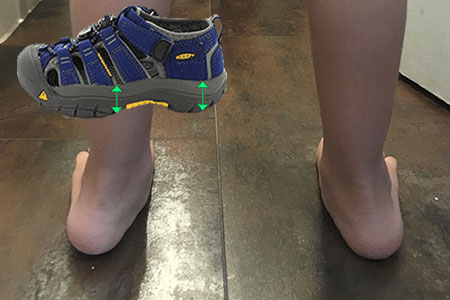
Children with low muscle tone (hypotonia) require supportive shoes that promote stability, comfort, and alignment. Does your child wear supportive sneakers and orthotics and you are unsure about what to do when the summer season arrives? As a passionate shoe fitter with years of experience, I have seen how the right sandals can act as an extension of supportive sneakers and also complement physical therapy exercises aimed at building muscle tone and coordination.
Supportive Sandals Can Help Improve Posture and Stability
I always like to make the analogy that if you want to build a strong house, you need a strong foundation. Supporting your children’s feet is essential for their legs and body to function properly.
Before we move forward, I want to clarify a common misconception about low muscle tone. Several parents associate low muscle tone with children being weak. This is far from the truth, low muscle tone is a stability problem, not a strength problem. Your child can be incredibly strong and still have low muscle tone.
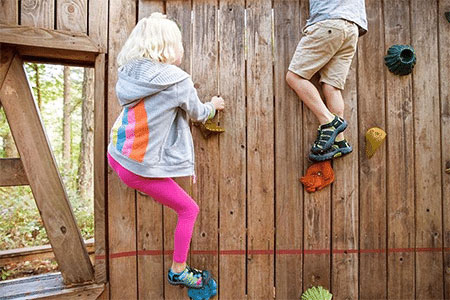
The issue that most children with low muscle tone face is the lack of arch development and therefore a lack of stability. I have helped several children with low muscle tone and loose ligaments in their feet find the correct pair of shoes to improve their foot posture and stability.
The Importance of Supportive Sandals
By choosing sandals that provide the necessary support, parents can help mitigate some of the challenges associated with hypotonia, enabling their children to engage more fully in their daily lives. Supportive sandals can also alleviate some of the fatigue associated with hypotonia, as they can help distribute weight more evenly across the foot.
Why Crocs and Flip-Flops Are Not an Option
While Crocs and flip-flops are popular choices for many children due to their ease of use and vibrant colors, they may not be suitable for those with low muscle tone. These types of footwear often lack the necessary support and stability, which can lead to an increased risk of falls and improper foot development. Yes, I know they are comfortable, practical, and children love to wear them, but they don’t offer any support whatsoever!
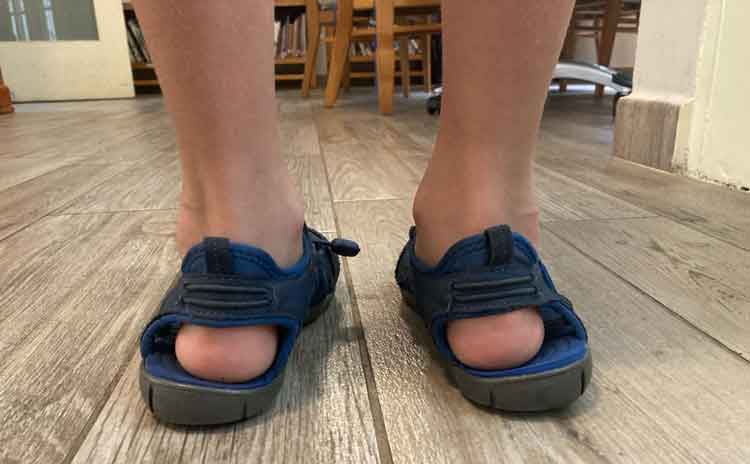
Key Features of Supportive Sandals for Kids with Low Muscle Tone
Sandals that provide substantial outsoles with arch support are essential for children with low muscle tone and/or loose ligaments. This external support is critical to ensure a strong and stable base for your child.
1. Feature One: Stable Base of Support
A stable base of support is crucial for children with low muscle tone. This feature helps maintain balance and provides the necessary foundation for walking and playing. A stable base often includes a wide sole that offers more surface area for contact with the ground, reducing the risk of falls.

A well-designed stable base acts as a foundation, encouraging more natural and secure steps. Let me help you visualize the difference between most children’s sandals and one of the specific sandals that I recommend.
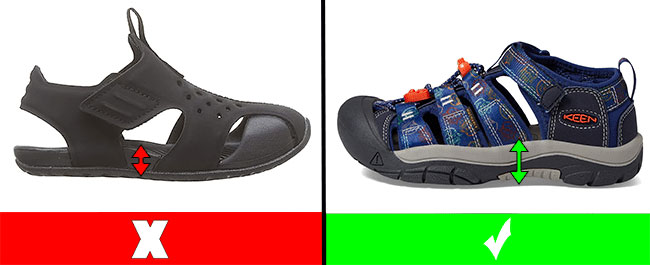
Feature Two: Targeted Cushion and Padding Below the Heels
Cushioning and padding are important for absorbing shock and providing comfort. Sandals with targeted cushioning below the heels can reduce stress on the feet and legs, managing fatigue and allowing children to remain active for longer periods without discomfort.
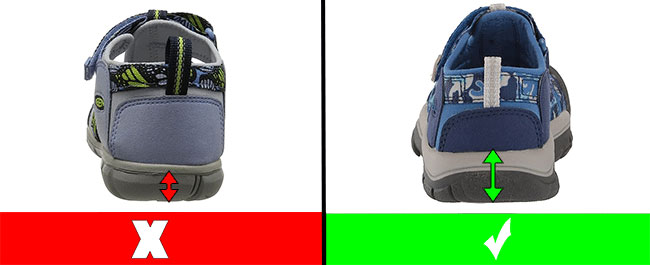
Feature Three: Lightweight and Flexible
Lightweight and flexible sandals allow for easier movement, reducing the effort required to walk. This feature is particularly beneficial for children with hypotonia, who may tire more quickly.
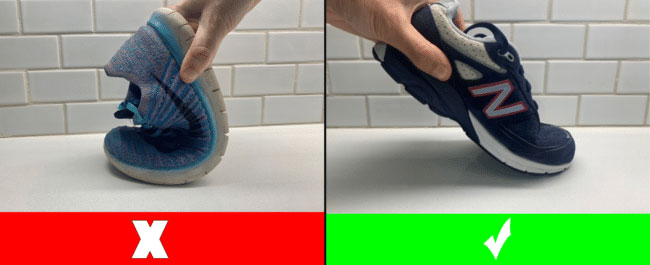
The sandals I recommend below provide these three important features and they also come with a velcro strap and a toggle closure to hold your child’s feet in place and provide better support and stability. Disclosure: Some links in this post may be affiliate links and we may receive a small commission (at no extra cost to you) when you click our links and make purchases.
Best Sandals for Kids with Low Muscle Tone to Improve Balance
These sandals will help realign your child’s feet and provide a more stable base of support so your child can balance better.
1. Psyclone by Teva
These supportive sandals by Teva are designed with a cushioned footbed and adjustable straps, to provide your child with low muscle tone with comfort and stability.
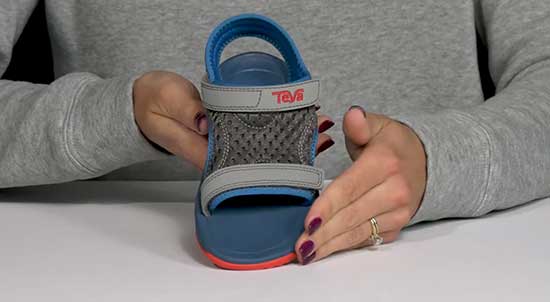
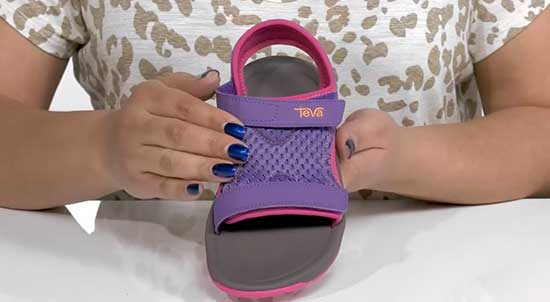
Key Features
- Order the sandal style Psyclone XLT1 by Teva on Zappos or Amazon
- Fits medium, wide, and extra wide feet (fits high insteps)
- Eva foam footbed cushions and softly supports
- Rubber outsole for great traction
- I suggest that you get this sandal a half size larger than your child’s current foot size
2. Agnes by Memo
These orthopedic sandals by Memo come with built-in arch support and heel stabilization, which are crucial for children with hypotonia. These features can help maintain proper foot alignment.
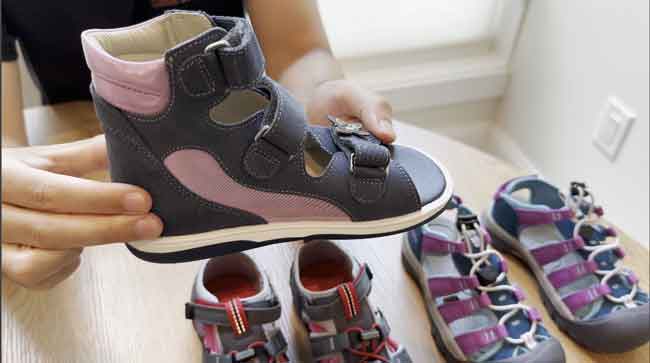
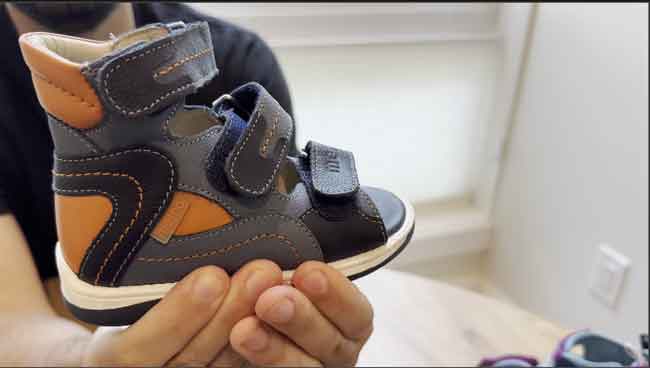
Key Features
- Order the shoe style Michael Corrective Orthopedic by Memo on Amazon
- Fits medium and wide feet (fits high insteps)
- 100% leather made
- Ability to adjust the Hook and Loop strap length to the different foot width
- I suggest that you get this sandal a whole size larger than your child’s current foot size
3. Seaturtle by Kamik
These open-toe sandals provide a cushioned footbed and adjustable straps. Their lightweight and flexible design makes it ideal for active children, while the durable outsole ensures long-lasting wear.
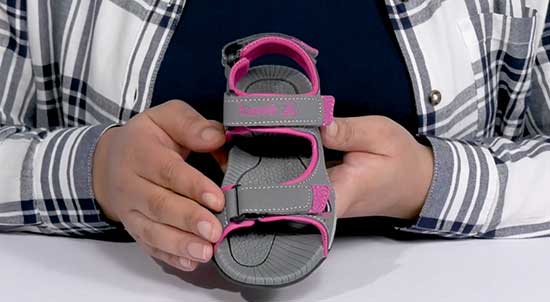
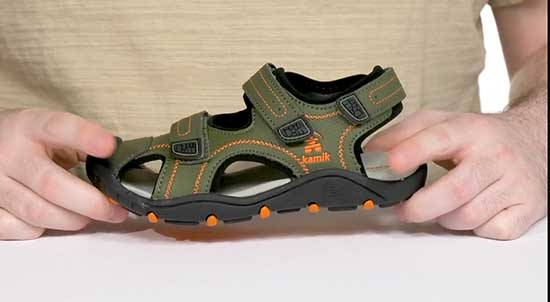
Key Features
- Order the shoe style Wander by Kamik on Amazon or Zappos
- Fits medium and wide feet (fits high insteps)
- Triple velcro straps for easy on and off
- Quick drying moisture wicking lining
- Vegan-friendly
- I suggest that you get this sandal a whole size larger than your child’s current foot size
4. Mogami by Birkenstock
Birkenstock is known for its exceptional arch support, and the Mogami sandal is no exception. It features a contoured cork footbed that provides natural arch support, making it ideal for children who require additional support and stability.
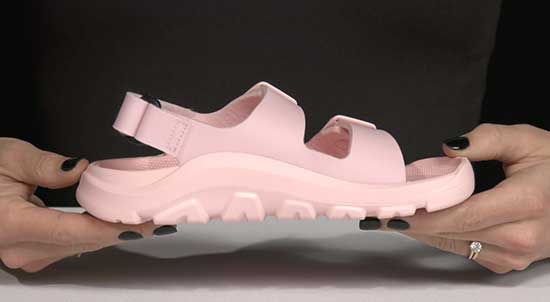
Key Features
- Order the sandal style Adventurous Light-Weight by Dream Pairs on Amazon or Zappos
- Fits medium and wide feet
- Triple hook-and-loop closure system for easy on and off
- Excellent grip
- Contoured PU footbed
- I suggest that you get this sandal a whole size larger than your child’s current foot size
5. Newport by Keen
Newport by Keen is a versatile sandal with a supportive footbed and adjustable straps. This is one of my go-to sandals for kids with flat feet and low muscle tone.
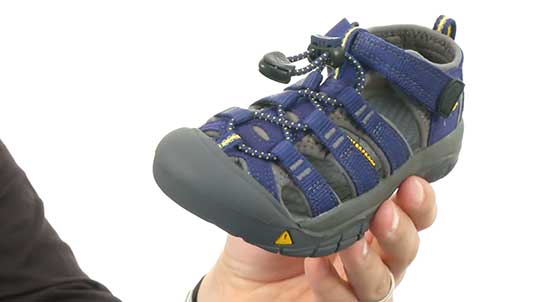
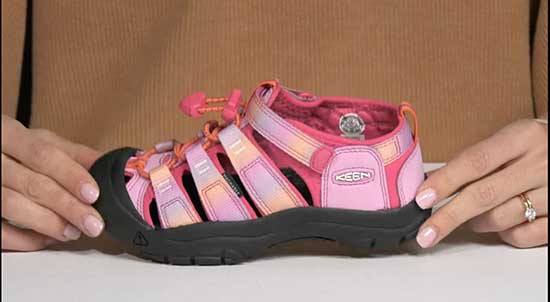
Key Features
- Order the sandal style Newport H2 by Keen on Zappos or Amazon
- Fits medium and wide feet
- This internal support mechanism is anatomically engineered to provide excellent arch support
- Machine washable
- I suggest that you get this sandal a half size larger than your child’s current foot size
6. Hurricane by Teva
The Hurricane by Teva offers a lightweight, water-friendly design with an adjustable fit. Its contoured footbed provides excellent support and stability.
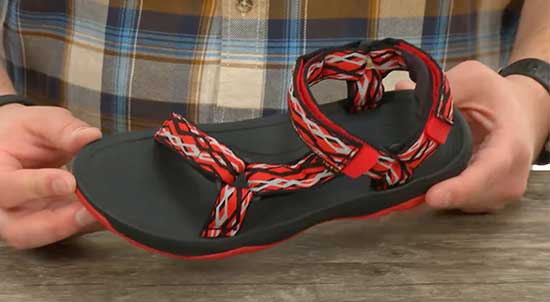
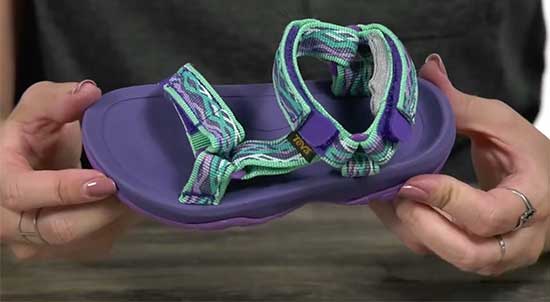
Key Features
- Order the sandal Hurricane by Teva on Zappos or Amazon
- Fits medium and wide feet
- This internal support mechanism is anatomically engineered to provide excellent arch support
- Machine washable
- I suggest that you get this sandal a half size larger than your child’s current foot size
7. Betti and Pedro by Memo
Orthopedic sandals are specifically designed to support foot health and address various conditions, including low muscle tone. Memo’s Betti and Pedro sandals are equipped with a robust support system, including a firm heel counter and arch support.
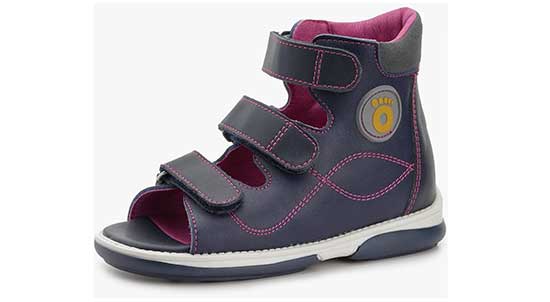
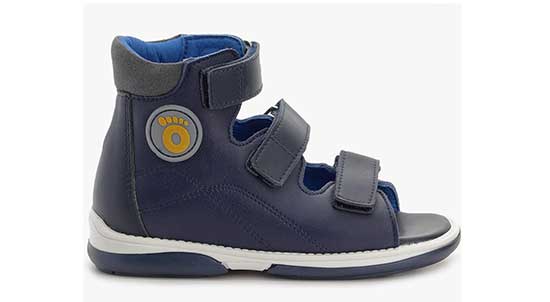
Key Features
- Order the sandal style Betti by Memo on Amazon
- Fits medium and wide feet
- This is an orthopedic sandal
- Thermoplastic asymmetric stiff heel counter for proper feet protection and support
- Genuine leather lining
- I suggest that you get this sandal a whole size larger than your child’s current foot size
How low muscle tone impacts children differs from child to child, so how effective these sandals will be for your child depends on whether the level of your child’s low muscle tone is mild, moderate, or severe.
Reach Out for Personalized Recommendations
Selecting the right sandals for your child can feel overwhelming, but you don’t have to do it alone. If you’re unsure which sandals are best for your child’s low muscle tone, consider reaching out via email for specific shoe recommendations based on your child’s foot shape and needs.
Important: Read This Before Ordering Your Kids’ Sandals Online
Ill-fitting shoes can lead to discomfort and exacerbate existing issues. Properly sized sandals ensure that all supportive features function as intended, providing the necessary stability and cushioning.
For your child to get the full benefits that the sandals have to offer, you must order the sandals in the correct size. I created a virtual shoe fitting service that will help you retrieve your child’s shoe size from home. In that resource, you will find out whether your child has narrow, medium, wide, or extra wide feet. I also will be able to determine whether your child has a high instep or not.
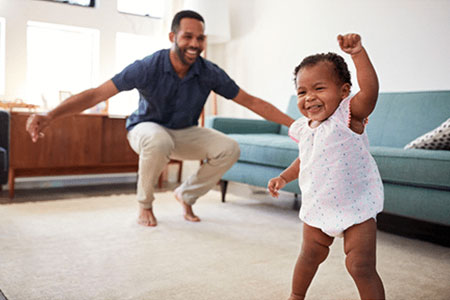
Make sure that you keep your children in good supportive sneakers for most of the day to help their movement and protect their joints from becoming permanently misaligned.
Bonus Resource: Supportive Sneakers and Orthotics
In addition to sandals, supportive sneakers and orthotics can play a vital role in managing hypotonia in children. Sneakers designed with a firm heel counter, arch support, and a stable sole can offer excellent support for daily activities. They provide a more enclosed environment that can help control the foot’s movement, offering a greater sense of security.
Orthotics can further aid in correcting foot alignment and improving overall stability. These custom devices can be tailored to address specific needs, providing targeted support to areas that require it the most. Integrating orthotics with supportive sneakers can enhance the benefits of both, leading to improved balance and mobility in children with hypotonia.
Should You Invest in a Pair of Orthopedic Sandals?
You certainly can provide your child with a pair of orthopedic sandals if you believe that your child might benefit from wearing them. Maybe your medical professional recommended a pair of orthopedic sandals and you are willing to try and do everything that’s in your hands to help your child.
Orthopedic sandals often incorporate advanced features and materials that cater to the specific needs of children with hypotonia. However, the issue is that they can range anywhere from $100 to $150. .
Supportive Sandals for Kids with Low Muscle Tone – Watch Video!
I created a video where we dive deep into the best sandals designed to support and encourage proper walking mechanics for children with low muscle tone. This video will help you visualize what specific features your kids’ sandals should provide to help improve your child’s walking gait, foot posture, and stability.
My Final Thoughts on Children with Low Muscle Tone
Every child’s situation is different. In my experience, most children with low muscle tone benefit from wearing shoes with flexible outsoles that provide a firm heel counter and a substantial outsole at the same time. These are the types of features that we need to look for in your kids’ summer shoes.
Pediatric physical therapy can be very helpful as it will help activate your child’s muscles by guiding them into proper alignment through exercises. Another option is to guide your child’s feet and ankles into proper alignment through the correct type of footwear, and in certain cases (depending on the degree of your child’s low muscle tone), orthotics as well.
Please trust your parental intuition if you notice something off about your child’s feet and/or walking gait. You know when there is something wrong with your child, you are living with the child, not your doctor.
Some common signs of children with low muscle tone are:
- Poor posture.
- Increased flexibility in their joints.
- Get tired easily because of the extra effort they have to put in to activate their muscles or maintain their posture.
- Experience delays in reaching gross motor milestones, such as rolling, sitting, crawling, or walking.
“Low Muscle Tone And Your Child – What You Need To Know.” Surestep, 1 Dec. 2016, surestep.net/blog/low-muscle-tone-hypotonia-an-overview-for-parents/.
“Muscle Weakness (Hypotonia): Boston Children’s Hospital.” Boston Children’s Hospital,www.childrenshospital.org/conditions-and-treatments/conditions/m/muscle-weakness-hypotonia.

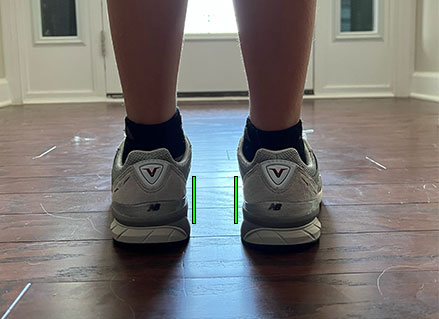
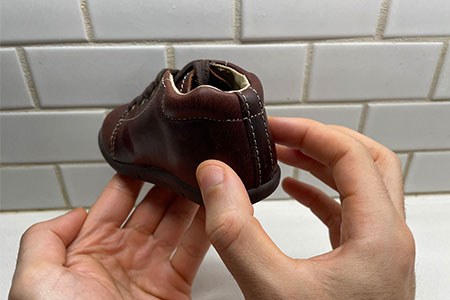

Thanks for sharing your thoughts in these posts! Question: The Keen sandals you link to have curved lasts, but in your article on best shoes for kids with low tone, you suggest shoes with straight lasts. If that’s important, why do you recommend the Keens?
Hello Elisa,
There are very few kids’ sandals that provide straight lasts. The reason why I recommend the Newport style by Keen is that even though t doesn’t provide a straight last, it provides an anatomical footbed with a stable base of support that can help improve the child’s posture and walking gait. With that said, sandals should not be any child’s primary piece of footwear, as they don’t provide the same features as a sneaker.
Thanks!
I am happy to help!
Do you recommend the Keen sandal above for a child who typically wears a wide width and needs a wide toe box? One child measures 10 wide and another 1 wide. Both wear custom-cast half-foot orthotics in their sneakers.
Thank you.
Nicole
Hello Nicole,
From Keen the most supportive style that is also capable of fitting a child with wide feet is the Newport Style
The other Keen sandal styles don’t provide enough support and won’t fit the shape of a child with wide feet.